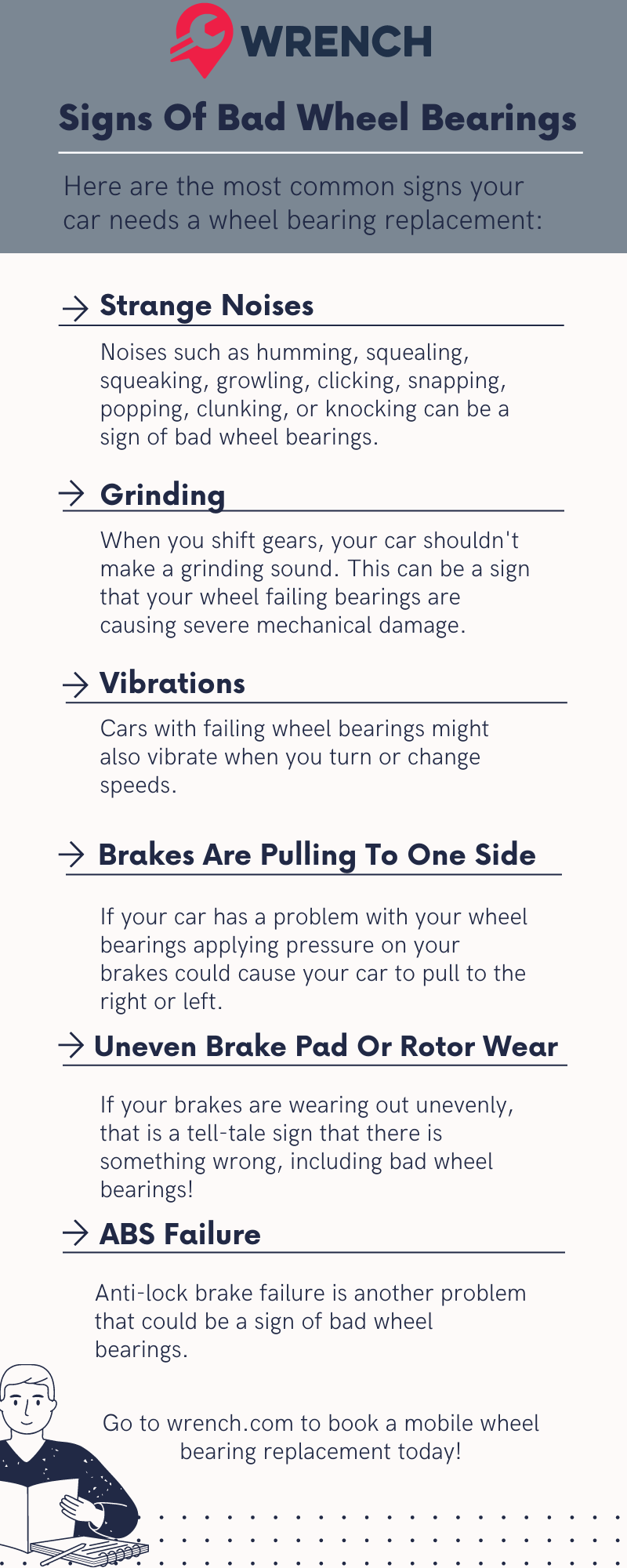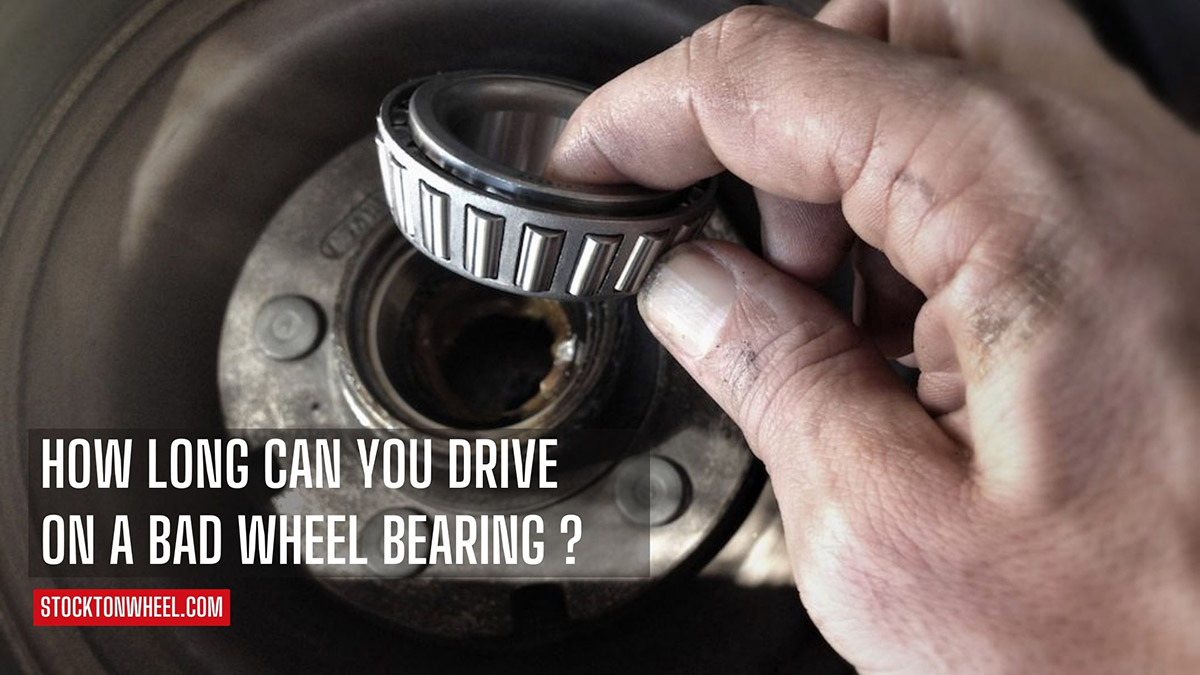As an Amazon Associate, I earn from qualifying purchases at no extra cost to you.
How Long Can You Drive With a Bad Wheel Bearing?
You can drive with a bad wheel bearing, but it can lead to serious safety risks over time. A bad wheel bearing can cause wheel wobbling or even detachment, so it’s recommended to replace it promptly.
When a wheel bearing is failing, it may produce a humming or grinding noise, worsen with time, and should not be ignored. Neglecting this issue could result in wheel misalignment, reduced brake effectiveness, or even a tire coming off while driving.
To avoid potential accidents or more costly repairs down the road, address a bad wheel bearing promptly. Your safety on the road is paramount, so don’t delay fixing this critical component of your vehicle.
Signs Of A Bad Wheel Bearing
Strange Noises
One of the most common signs of a bad wheel bearing is strange noises, such as grinding, humming, clicking, or clunking sounds coming from the wheels. These noises can become more pronounced as the vehicle speeds up or when turning.
Vibration And Uneven Tire Wear
A bad wheel bearing can cause vibrations in the steering wheel or the vehicle itself. It can also lead to uneven tire wear due to the misalignment caused by the failing bearing.
Steering Difficulties
If you experience difficulty steering, especially at low speeds, it could be a sign of a bad wheel bearing. The steering may feel loose or unresponsive due to the worn-out bearing.

Credit: www.way.com
Effects Of Driving With A Bad Wheel Bearing
Driving with a bad wheel bearing can have serious repercussions on both your vehicle's performance and your safety on the road.
Further Damage To The Vehicle
Driving with a bad wheel bearing can lead to premature wear and damage to other critical components of the vehicle.
Increased Risk Of Accidents
A bad wheel bearing can cause the wheel to lock up or come loose, increasing the chances of losing control and causing accidents.
Also Read: How Long Can You Drive With a Bad Tie Rod?
Determining The Safe Driving Range
Severity Of The Wheel Bearing Issue
A bad wheel bearing can vary in severity and can affect safety. Driving with a severely damaged wheel bearing is dangerous.
Driving Conditions
The driving conditions play a critical role in the impact of a bad wheel bearing. Uneven or rough road surfaces can worsen the problem.
Speed And Distance
The speed and distance you drive with a bad wheel bearing can accelerate the issue causing a major breakdown. Regular inspection is crucial.

Credit: wrench.com
Taking Immediate Action
Taking immediate action when you suspect a bad wheel bearing is crucial for your safety and the well-being of your vehicle. If you suspect that your wheel bearing is failing, it is essential to get it inspected and address the issue promptly.
Getting The Wheel Bearing Inspected
A professional inspection is the most essential first step in determining the extent of the issue. A certified mechanic will be able to diagnose the condition accurately and provide expert advice on the best course of action to take.
Repair Or Replacement Options
Upon inspection, the mechanic will discuss whether a repair is feasible or if a replacement is necessary. Depending on the severity of the damage, they may recommend repacking the bearings or installing a new wheel bearing assembly.
Preventing Wheel Bearing Issues
A bad wheel bearing can lead to various problems while driving, including noise, vibration, and potential loss of control. It is essential to ensure your wheel bearings are in good condition for a safe and smooth driving experience. By following regular maintenance and proper lubrication, you can prevent potential issues with your wheel bearings.
Regular Maintenance And Inspections
Regular maintenance and inspections play a crucial role in preventing problems with your wheel bearings. It is recommended to inspect your wheel bearings at least once a year or every 12,000 miles, whichever comes first. During these inspections, check for any signs of damage, wear, or loose areas in the bearing assembly. This inspection can be done by a professional mechanic or done yourself if you are comfortable with it. Identifying and addressing any issues early can help extend the life of your wheel bearings and prevent further damage.
Proper Lubrication
Proper lubrication is vital for ensuring the smooth operation of your wheel bearings. The bearings need sufficient grease to reduce friction and heat buildup. Regularly check the grease level and ensure it is at the recommended level. If the grease appears dirty or contaminated, it may be necessary to clean and repack the bearings with fresh grease. Additionally, make sure to use the correct type of grease recommended by the manufacturer for your specific wheel bearings. Following the proper lubrication guidelines will prevent premature wear and damage to your bearings.

Credit: www.stocktonwheel.com
When To Seek Professional Help
Knowing when to seek professional help for a bad wheel bearing is crucial for your safety on the road. Lack of mechanical knowledge and the potential safety concerns are important factors to consider. In this section, we will delve into these aspects to help you make an informed decision.
Lack Of Mechanical Knowledge
If you lack mechanical knowledge or experience, attempting to fix a bad wheel bearing yourself can be challenging and potentially risky. Wheel bearings are intricate components that require specialized tools and expertise to be properly installed or replaced. Without the necessary knowledge, you may risk causing further damage to your vehicle, compromising your safety, and even incurring additional expenses.
Seeking professional help when you lack mechanical knowledge not only ensures a proper diagnosis of the bad wheel bearing but also guarantees that the repair or replacement is done correctly. There’s no need to stress about the intricacies of the process or waste time on trial and error when experts are equipped to handle the job efficiently.
Safety Concerns
Driving with a bad wheel bearing poses significant safety concerns that shouldn’t be ignored. When a wheel bearing is faulty, it can affect your vehicle’s stability and handling, increasing the risk of accidents. The structural integrity of your wheel can be compromised, leading to potential problems such as uneven tire wear, unpredictable steering, and even loss of control.
Timely professional intervention is essential to prevent safety hazards associated with bad wheel bearings. By seeking help at the right time, you are taking a proactive approach towards maintaining your safety and that of others on the road. Professional mechanics possess the expertise to diagnose and repair your bad wheel bearings, ensuring your vehicle operates optimally, and you can drive with peace of mind.
Conclusion
Driving with a bad wheel bearing can lead to serious safety risks. It’s essential to promptly address any issues to avoid further damage and ensure a smooth driving experience. Regular maintenance and timely repairs are crucial for vehicle safety and to prevent costly repairs in the long run.
Be pro-active and ensure your vehicle’s wheel bearings are in good condition for a safe and comfortable ride.


